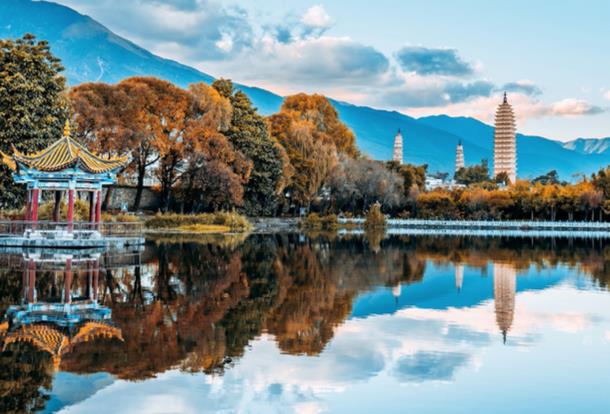In 2020, I only read one type of China travel story.
These sagas told of the winding journeys my McKinsey alumni friends took from the U.S. to get back to China’s Covid-free “liberated zone”. The phrase brings to mind Chairman Mao holding court in his cave refuge in Yan’an, a puffy dusty brown winter coat draped over his shoulders.
The modern day journeys to the liberated zone are less dangerous than the revolutionary’s Long March, but are still exciting, requiring commitment and creativity to jump through multiple hoops. For example, it’s no small feat to secure a visa when Chinese consulates are closed. The exorbitant flight tickets and strict 14-day quarantine have seen any dream of leisure travel packed away with the luggage in the basement.
China has never been more remote, and life there has never been more foreign, to anyone outside.
Right now it’s very hard to even imagine traveling to China. But that day will come. China will be a great destination again, with many changes and challenges.
Everyone in the travel industry is talking about recovery in 2021’s third quarter, or maybe even the second. Hope hangs on mass vaccinations in the spring and a subsequent opening up of inbound and outbound traffic.
However, the pandemic hasn’t been that bad for domestic travel businesses. As of October, the Chinese travel industry has recovered to 80% of where it was 2019, according to a Chinese Tourism Research Institute report.
Chinese travelers previously always favored traveling overseas whenever possible, while ignoring the treasures at home. But travel restrictions fenced Chinese travelers in. Many turned their attention to far-flung corners that had often been on the back burner, such as the northwestern regions of Qinghai, Gansu and Ningxia. Many were shocked everyone to see that most searched tailor-made trips on Ctrip.com include Lhasa and Mount Kailash in Tibet, as well as Zhangye and Dunhuang in Gansu.
Accordingly, hotel prices in these remote locations hit record heights. A night in a twin room at a resort in Xishuangbanna can cost 2,000 yuan, with suites reaching up to 18,000 yuan. Supply and demand!
Opening up the border to two-way travel is much needed — simply to keep the market balanced. Hopefully, the gouging will end, and rational pricing will return. The domestic travel crowds will grace starved destinations overseas, leaving some room for international travelers to enter China.
Hotels in China continued to open in 2020 and they are eager to welcome back some international clientele to achieve a more balanced client mix. Banyan Tree Jiuzhaigou Hotel, a beautiful property set in northern Sichuan province, opened its doors in 2017 and was immediately hit by a massive earthquake. They reopened in 2018, and were shut down again by Covid-19. They opened for the third time in the second half of 2020, and domestic travelers flooded in. Banyan Tree has traditionally prided itself on serving a high-end international crowd. Now, more than ever, promotional deals and packages are in the making for the international market.
The pandemic forced crowd control measures on almost all tourist sites, and this will improve the China travel experience in a big way. From the heart of Beijing to remote places in the desert, most sites are only allowed to operate at 30% of previous capacity. For example, the Dunhuang Grottoes, a UNESCO cultural heritage site in Gansu now issues only 1,800 tickets per day. Many tourist sites have implemented reservation systems that pre-assign a time slot. This leaves breathing room, literally, for a much better visitor experience. I have no doubt that this percentage will go back to 100% over time but the pandemic has conditioned the general public to book ahead of time, creating a more orderly experience on-site.
The pandemic also reshaped Chinese travelers’ preferences from pilgrimages to famous tourist sites to embracing the outdoors. This change initially grew out of health concerns, as its safer to be in the mountains than in crowded theme parks. According to November booking data on Ctrip, the top searched themes are skiing, wilderness driving and outdoor exploration. I believe this forced change of travel preference is here to stay. Once a traveler finds joy in nature, it’s hard to go back to queuing at tourist sites again. This hopefully will ease the crowding problem at places like the Forbidden City, again making China a more pleasant place to visit.
Domestic clients fully demonstrated their tremendous purchasing power to local businesses in the second half of 2020. This is good for local business but not great for inbound China visitors.
Wonderful experiences and services developed in stunning locations in China are now much more geared toward serving domestic clients, making it very difficult for non-Chinese speakers to access. The River Collection, a beautiful cluster of B&Bs by the Yellow River in Ningxia, is tastefully done. There are packages of eight-treasures tea and French press coffee in each room, but there isn’t an English menu or anyone who speaks English there. In some ways, China is developing in the direction of Japan. Beautiful services are developed for domestic consumption and its neigh-on impossible to find the treasures without an English-speaking guide.
Some very special locations are reserved exclusively for Chinese nationals, though not by choice of the operator. The Songtsam Lodges, a chain of boutique lodges that originated in Shangri-La, Yunnan, opened up a series of five small lodges further along the Yunnan-Tibet highway in 2020. With views of snowy mountains in the distance, these lodges are absolutely breathtaking. But, the entire route from Deqin, Yunnan northwest into Tibet is closed to non-Chinese citizens. Pandemic or not, I wouldn’t hold my breath for a change in the near future.
Many inbound travel companies in China may not make it out of the prolonged winter this year. This means their guides and drivers will have changed jobs to pay their mortgage, or kids’ tuition. By the time international travelers return, good travel designers and guides will be thin on the ground. Naturally, costs are likely to take a hike too. China will emerge post-pandemic a much more expensive destination than before.
Most importantly, I worry about the attractiveness of the Chinese brand. China has long enjoyed a cuddly image of a panda bear. Now with fewer pandas left in the wild, travelers may mistake us for a bear. That can’t be good for business.
Read original article




